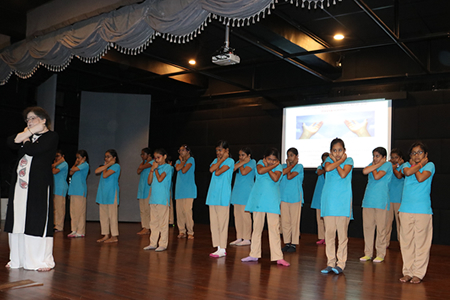Culture plays an important part in developing one’s identity, belonging and a sense of self. However, in today’s world, globalization and technological advancements have paved the way for an inflow of foreign cultures, leading to a cultural identification threat. At this juncture it is critical, especially for children, to understand and experience their culture in its various forms, and develop a connection and pride in their cultural heritage.
This understanding has permeated in all aspects of life and learning at Hari Shree Vidyalayam: be it in its Tamilnadu-Kerala architecture, class environment and names, greetings, celebration of festivals and co-curricular activities. This, in turn, promotes a positive personal and cultural identity which enhances understanding and appreciation of one’s family background, heritage, beliefs and perspectives in a pluralistic society.
“India is one of the oldest and most remarkable living civilizations in the world; a kaleidoscope of rich heritage and culture. The source of this wisdom, tradition, science and culture is the Vedas, a sacred and timeless spiritual knowledge.
The culture of the people of India is religious. Indian culture will disappear if its constituent elements are devoid of any religious content.
Language, dress, home, food, customs, manners and fine and performing arts are the elements that constitute the culture of a given group of people. None of these needs to have anything to do with religion. Therefore, one can see a more or less secular culture in many countries.
In Indian culture, however, all these elements are connected to the Vedic religion. This is so because in the Vedic vision of God, the world is non-separate from Him. All human pursuits are also connected to religion. The pursuit of wealth is seeking the grace of the Goddess of Wealth, Dhanalakṣmῑ; making a good home is the grace of Gṛhalakṣmῑ; success is Jayalakṣmῑ; children are Santānalakṣmῑ; marriage is Varalakṣmῑ and one’s well-being is Saubhāgyalakṣmῑ. Even virtues like courage and strength are looked upon as the grace of God. Any knowledge is looked upon as Goddess Sarasvatῑ. In short, no pursuit or object of pursuit is secular. The human body itself is a temple. Bathing, dressing and ornamentation, alaṇkāra, are all a ritual of worship. Washing the dwelling place every day and decorating the entrance with rangoli are done to invite Goddess Lakṣmῑ. Greeting people with folded hands is an act of worship.
This religious culture, which touches every aspect of one’s life, including the scheme of things in which one lives, was imbibed naturally from one’s home and the cultural atmosphere of the immediate community. Not any more. Today, parents are busy earning their livelihood in the competitive society and a joint family is a rare exception. So, the children have to be taught methodically the religious cultural forms and their meaning, in a classroom situation.”
– Swami Dayananda Saraswati,
Rishikesh, India

The vedic heritage teaching programme is a guide for educational institutions, communities and families that wish to teach vedic heritage to their children in an authentic, systematic manner. The programme develops an understanding of Dharma (Values) in the Vedic tradition. It consists of teaching materials, assignments, lesson plans, and fun filled exercises.
The subject matter has been designed to be taught to children over a period of 12 years using books and workbooks. Individual Values such as Truthfulness, Not hurting others, Respect, Straightforwardness, Friendliness and many other Universal values are analyzed.
(Inspired by and drawn from Pujya Swami Dayananda Saraswati ji’s foreword)

UTSAV, an annual event celebrates Bharatiya culture, heritage and traditions. This immersive learning experience is aimed to develop an interest to know more about our civilization.
Utsav is about exploring and experiencing culture through field visits, lecture demonstrations, short films and interactive sessions with experts from diverse fields. It is an opportunity to understand and reflect ‘why we do what we do’ and imbibe traditional wisdom, which has stood the test of time and which is being increasingly lost in a dynamically changing world.
Students are encouraged to choose projects to research based on their specific areas of interest and discussions with like-minded peers.
Our aim is to transcend the scope of their project and continue to provoke thoughts, ideas, questions, analyses and perspectives going forward.

Festivals are celebrated in three layers: (i) the festivities,(ii) knowing the historic facts and ethos of the festival and understanding how similar or different such celebrations are globally and (iii) a reflection of values and what they mean to the individual and to the society as a whole.
This gives an in-depth understanding of traditional and regional practices.

The Bhagavad Gita is a dialogue between Lord Krishna and Arjuna at the battlefield just before the commencement of the great Mahabharata war. It comprises the eternal teachings of Lord Krishna as he dispelled Arjuna’s sorrow and confusion regarding his duties. It is a revered tradition at Hari Shree for children to recite the Bhagavad Gita during their formative years.

Yoga is an integral part of the curriculum for kindergarten, primary and middle school students at Hari Shree. The children are taught Asanas and Pranayama for healthy living.
Regular practice of asanas helps students to develop physical strength, balance and flexibility, while ‘Pranayama’ helps them regulate their breath, thereby enhancing mindfulness and cognitive performance.

thorbhi: means with hands
karnam means ears.
holding ears with hands
Practising Thorbi Karnam regularly activates both the left and right brain, which facilitates holistic development. It improves memory, focus, concentration and creativity. This brain boosting exercise is practised everyday at Hari Shree in the classroom.

There is a Vigraham of Lord Krishna in the center of a courtyard surrounded by Tulsi plants. It is a morning ritual to start the day by worshipping the vigraham of Lord Krishna at Vrindavan.
All images and text @ Copyright Chettinad Hari Shree Vidyalayam. All Rights Reserved.